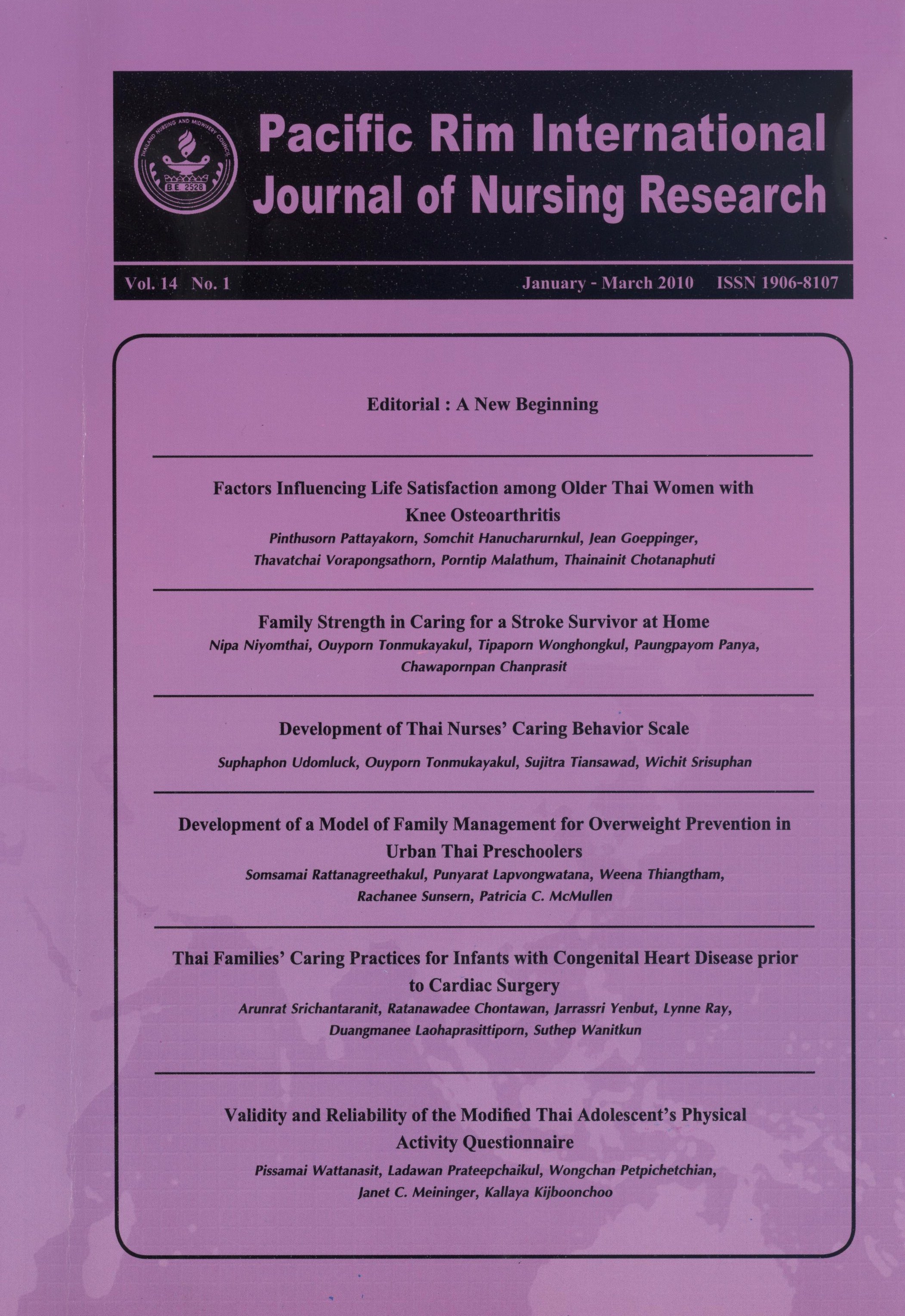Development of a Model of Family Management for Overweight Prevention in Urban Thai Preschoolers
Keywords:
รูปแบบการจัดการโดยครอบครัว, การป้องกันภาวะโภชนาการเกิน, เด็กวัยก่อนเรียน, การวิจัยเชิงปฏิบัติการแบบมีส่วนร่วม, Family management model, Preschooler overweight prevention, Family self-help group, School collaboration, Participatory action researchAbstract
บทคัดย่อ
การศึกษาครั้งนี้เป็นการวิจัยเชิงปฏิบัติการแบบมีส่วนร่วม(PAR) เพื่อศึกษาปัจจัยเสี่ยงที่มีอิทธิพล ต่อภาวะโภชนาการเกินและพัฒนารูปแบบการจัดการโดยครอบครัวเพื่อป้องกันภาวะโภชนาการเกินในเด็กก่อนวัยเรียน ในโรงเรียนประถมศึกษาแห่งหนึ่งในเขตเทศบาลเมืองแสนสุข จังหวัดชลบุรี ดำเนินการวิจัย โดยการเก็บข้อมูลด้วยแบบสอบ ถามจากผู้ปกครองเด็กก่อนวัยเรียน 327 คน เพื่อวิเคราะห์ปัญหาและปัจจัยเสี่ยง และการพัฒนารูปแบบ ผ่านการจัดเวทีระดมความคิดและการอบรมแก่ผู้มีส่วนเกี่ยวข้อง 59 คน และเยี่ยมบ้านผู้เข้าร่วมการพัฒนารูปแบบการจัดการในระดับครอบครัว 27 ครอบครัว การเก็บรวบรวมข้อมูลใช้ทั้งเชิงปริมาณและเชิงคุณภาพ การวิเคราะห์ข้อมูลเชิงปริมาณใช้ การวิเคราะห์การวัดความแปรปรวนแบบวัดซ้ำ ข้อมูลเชิงคุณภาพใช้การวิเคราะห์เชิงเนื้อหา
ผลการศึกษาได้รูปแบบการจัดการเพื่อควบคุมป้องกันภาวะโภชนาการเกินในเด็กก่อนวัยเรียนที่ครอบคลุมทั้งระดับครอบครัวและชุมชน ในระดับครอบครัวประกอบด้วย 1) กระบวนการจัดการในครอบครัว ได้แก่ การเตรียมความพร้อม การปฏิบัติและการจัดการ การสังเกตและการปรับเปลี่ยน 2) องค์ประกอบสำคัญในการจัดการได้แก่ การรับรู้และตระหนักในรูปร่างของเด็ก ความรู้ทักษะและการมีส่วนร่วมของครอบครัว ส่วนรูปแบบการจัดการในระดับชุมชน มีการประสานงานการทำงานกันเป็นเครือข่ายของ โรงเรียน พยาบาลสาธารณสุขและกลุ่มช่วยเหลือตนเองของผู้ปกครอง กระบวนการที่ใช้ในการดำเนินงานของรูปแบบ ได้แก่ 1) การเตรียมความพร้อมแก่ผู้มีส่วนเกี่ยวข้อง 2) การสร้างระบบการจัดการในครอบครัว 3) การแลกเปลี่ยนประสบการณ์และกระตุ้นส่งเสริม 4) การสร้างกลุ่มช่วยเหลือตนเองและเครือข่าย
ผลของรูปแบบการจัดการสามารถเพิ่มความรู้และทักษะการส่งเสริมพฤติกรรมสุขภาพแก่ครอบครัว ในครั้งนี้ 15 ครอบครัวประสบความสำเร็จสามารถควบคุมน้ำหนักเด็กให้เป็นไปตามเกณฑ์ และในระดับโรงเรียนสามารถลดอัตราภาวะโภชนาการเกินเด็กก่อนวัยเรียนจากร้อยละ 16.5 เหลือร้อยละ 13.8 ปัจจัยความสำเร็จและความยั่งยืนของการ วิจัยครั้งนี้ ได้แก่ การมีส่วนร่วมอย่างแท้จริงของครอบครัวและความร่วมมือดำเนินการของโรงเรียนในการประสานงานจากทุกภาคส่วนที่เกี่ยวข้องสร้างเป็นเครือข่ายดำเนินการเพื่อผลลัพธ์คือการพัฒนาเด็กให้มีการเจริญเติบโตที่สมวัย
คำสำคัญ : รูปแบบการจัดการโดยครอบครัว; การป้องกันภาวะโภชนาการเกิน; เด็กวัยก่อนเรียน; การวิจัยเชิงปฏิบัติการแบบมีส่วนร่วม
Abstract
The aim of this investigation was to develop, using Ecological Systems Theory (EST) as a contextual framework to determine influencing factors and desired outcomes, a family management model to prevent preschoolers from becoming overweight. A three-phase participatory action research (PAR) design was implemented with stakeholders in a public primary school in Thailand. In the first phase, 327 families with preschoolers were assessed, by way of a self-administered questionnaire, about factors that influence weight gain. The second phase consisted of two workshops, involving 59 stakeholders, and home visits to 27 families conducted for the purpose of developing the model. The final phase evaluated the effects of the model. Both quantitative and qualitative methods were used. A repeated measure ANOVA was performed to analyze the quantitative data, while content analysis was utilized to evaluate the qualitative data.
gement of overweight prevention in urban preschoolers emerged. The family component consisted of: a) family management processes: preparing a family’s readiness, acting or managing behaviors, and observing and modifying behaviors; and, b) family essential elements: perceptions and concerns about their preschooler’s body shape, nutritional knowledge and skills, participation and consensus. The school component consisted of networking among school organizations, while the public health component involved public health nurses, from the district, who provided school health services and served as co-investigators. Overall, based upon the spiral characteristics of the PAR process, the following procedural steps evolved: 1) preparing the participants; 2) organizing the family management; 3) sharing and promoting knowledge and experiences; and, 4) forming the network.
The model may enhance parents’ knowledge and skills of feeding practices, as well as improve preschoolers’ health behaviors. Fifteen families, through application of the model, were able to maintain their preschoolers’ healthy weight. Use of the model reduced the prevalence of overweight from 16.5% to 13.8 %.
The keys to success were derived from strong family participation in the PAR process and collaborating with school officials to enhance sustainability of the model. Therefore, networking of families, schools and public health nurses are important.
Keywords: Family management model; Preschooler overweight prevention; Family self-help group; School collaboration; Participatory action research
Downloads
How to Cite
Issue
Section
License
Copyright: The Pacific Rim International Journal of Nursing Research, Thailand Nursing & Midwifery Council has exclusive rights to publish, reproduce and distribute the manuscript and all contents therein.








.png)



